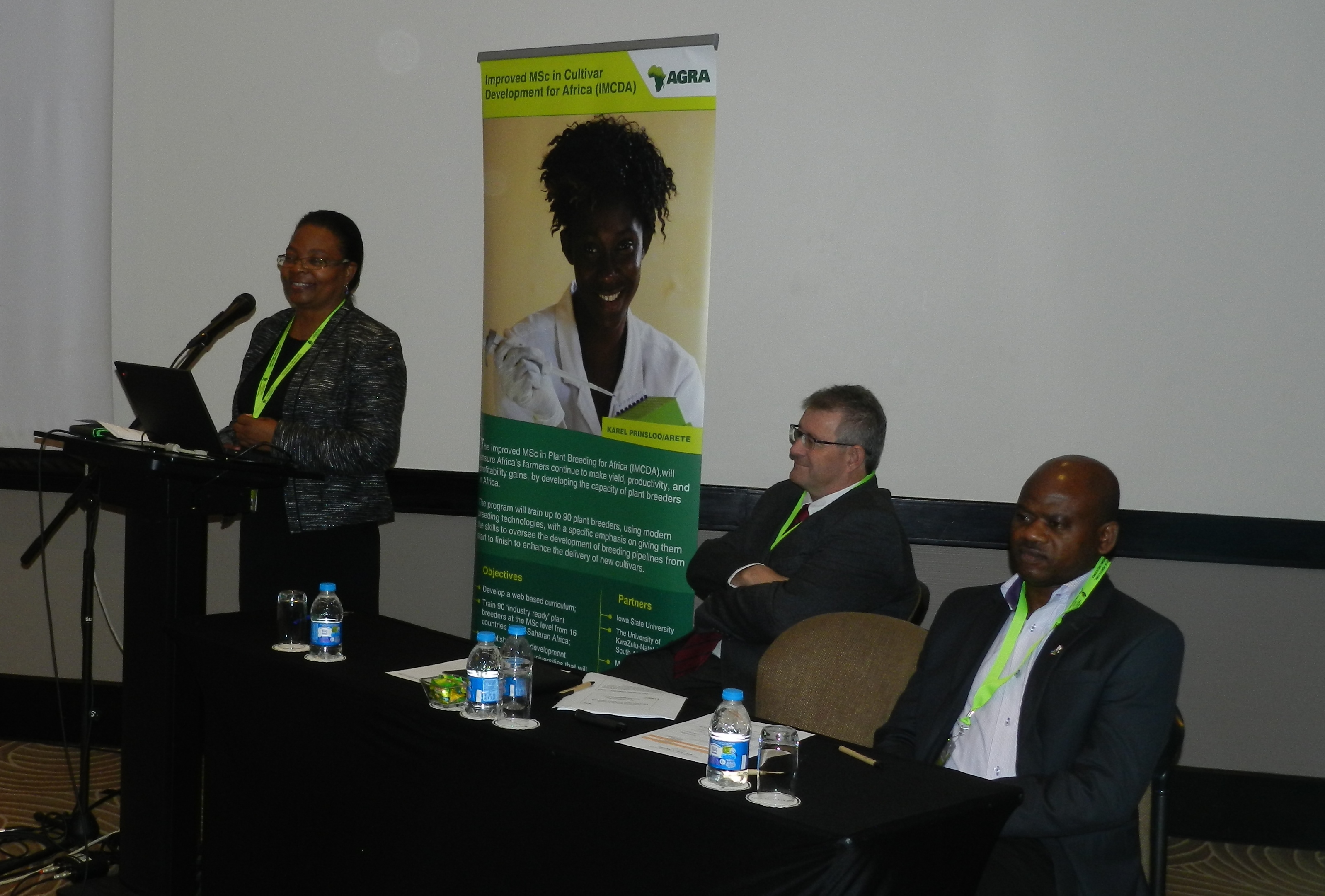The Improved Masters in Cultivar Development for Africa (IMCDA) programme, funded by the Alliance for a Green Revolution in Africa (AGRA) with funding received from the Bill and Melinda Gates Foundation (BMGF), held its fourth Joint Partners Meeting in Durban from the 11th-13th of July to bring together all those involved in the programme to review the progress in the implementation of the programme.
The programme is being implemented in three universities;
Kwame Nkrumah University of Science and Technology (KNUST) in Ghana,
Makerere University in Uganda, and the
University of KwaZulu-Natal (UKZN) in South Africa, which hosted this visit.
The IMCDA is designed to train plant breeders using modern breeding technologies, with a significant portion of the training delivered through e-learning materials developed by Iowa State University’s Plant Breeding E-Learning for Africa Project (PBEA) in collaboration with the African Partner Universities.
Programme Manager for UKZN, Dr Julia Sibiya, welcomed delegates to Durban, noting representation from Mexico, the USA, Italy, Kenya, Zimbabwe, Ethiopia, Malawi, Uganda, Ghana, Niger and the Regional Universities Forum for Capacity Building in Agriculture (RUFORUM). She welcomed the Vice-Chancellor and Principal of UKZN, Dr Albert van Jaarsveld, and Deputy Vice-Chancellor for the College of Agriculture, Engineering and Science (CAES) Professor Albert Modi, saying that the programme was honoured to have their support. The meeting took place over two days at the Southern Sun Elangeni-Maharani, with a working session on the final day at UKZN’s Howard College campus.
AGRA Programme Officer Dr Rufaro Madakadze delivered greetings from AGRA on behalf of its vice-president, Dr Joe DeVries and noted that Dr Gary Atlin, programme manager from the BMGF, would join via video conference during the event.
‘We are training a new breed of scientists/plant breeders with a product development mind-set that can work in the public or private sector,’ said Madakadze.
AGRA’s work is focused on small-holder farmers, seeking to transform how they do their work to improve livelihoods using numerous technologies, working with a wide range of partners to transform and kindle a green revolution in Africa.
‘The footprint of UKZN throughout the continent is enormous,’ said Madakadze. ‘Thank you for being one of our first key partners in capacity building and demonstrating how this can transform lives in Africa.’
She detailed that the programme had admitted 91 MSc students, graduated 21, and seen good progress on breeding programmes and academic staff skills upgrades. Seven of UKZN’s 2015 cohort graduated in April 2017, three of these cum laude.

Dr Rufaro Madakadze
| 
MSc Students at the 2017 Graduation Ceremony
|
The purpose of the meeting was to review the programme, learn, improve, sustain and scale-out. The meeting included articulation of progress of the programme including challenges and mitigation, feedback on e-curricula implementation and sustainability, lessons from internship students and hosts, and a strategy for scale-out of the programme.
Modi emphasised UKZN’s appreciation of the partnership with AGRA, which makes significant contributions to the mission of the university to inspire greatness in academia and in the lives of ordinary people.
Van Jaarsveld thanked organisers for the opportunity to welcome international partners and colleagues from the African continent to Durban and UKZN. He gave an overview of UKZN, noting especially the fact that half of the institution’s PhD graduates are from the rest of the African continent, making the IMCDA programme exemplary of what the university works to achieve.
UKZN’s new strategic plan is focused on transformation, supporting the African continent, and being a research-led university. Van Jaarsveld emphasised the institution’s continuing driving of its global competitiveness by focusing on its new research flagships, including African health, social cohesion and inequality, African cities of the future and big data and informatics.
Van Jaarsveld noted UKZN’s desire to pursue integration with private and public sectors and deliver relevant research, ensuring that UKZN will drive these partnerships through relevant curriculum and graduates.
‘I hope that in your few days here, you will take hands with colleagues from UKZN to collectively inspire greatness through everything that you do over the next couple of days,’ said van Jaarsveld.